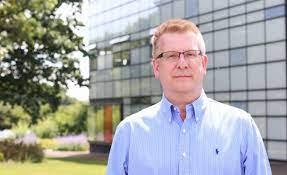You are here
- Home
- Space science solving challenges on earth
Space science solving challenges on earth

For more than two decades, Dr Geraint Morgan and colleagues in The Applied Science & Technology Group (ASTG) have used the OU's space know-how, from missions to explore the fabric of comets and Mars, to solve complex problems closer to home. They've practically applied these cutting-edge techniques to everything from developing better air quality monitoring systems on submarines and analysing the fragrance profile of individual perfumes to identifying fake Scotch whisky.
"The process essentially robotically 'sniffs' things to find out what they're made of," Dr Morgan explains. We heat liquids or solids until they become gases and then inject them into a long, chemical-lined tube called a gas chromatography (GS) column, separating the mixture into its component molecules. We can then use a mass spectrometer (MS) to identify these compounds' unique fingerprints. We call this process gas chromatography-mass spectrometry (GC-MS). We can also use two columns to further enhance this detective power through comprehensive gas chromatography (GCxGC)."
The team of chemists, physicists, engineers, geologists, microbiologists and computer scientists cut their teeth using this technology in space missions where there is no room for excess or error. "Our backgrounds mean we're always looking for ways to distil problems into their simplest form and research, design and build precise, portable, low-cost, low-maintenance and highly-durable analytical tools", Dr Morgan notes. "The University has also invested in world-leading analytical instrumentation that allows us to unlock the secrets of even the most complex samples, whether from Earth or space".
Dr Morgan has also recently applied these techniques to vital sustainability challenges. "We've designed tests to support an SME looking for traces of pollutants that could potentially derail nuclear fusion experiments. This research could be vital to removing our reliance on fossil fuels", he reveals. "We will also deploy our sniffing capabilities working with companies exploring the potential of capturing carbon from the atmosphere and storing it in decommissioned oil wells."
In August 2022, Dr Morgan will embark on a new venture he believes is a crucial next step in making these testing methods available at scale. "Over the next two years, I will be working to develop an affordable and practical breath test to detect the bacteria that is the primary cause of stomach ulcers and cancer. Essentially, I will go from developing instruments to look for signs of life in our solar system to hopefully saving and improving lives in India. While I'll do this outside of the OU, the project builds on the lessons learnt from my career and the University will remain a key part of this journey. I will continue collaborating with colleagues, and I hope it will lead to a pipeline of new impactful research opportunities."
Latest News
- Congratulations Professor Geraint (Taff) Morgan! 8th April 2025
- AstrobiologyOU 5 Year Report 4th March 2025
- PhD Opportunities Open For Applications 13th November 2024
- A potential breakthrough in battle against antibiotic resistance 23rd September 2024
- Introducing Professor Schwenzer 19th July 2024